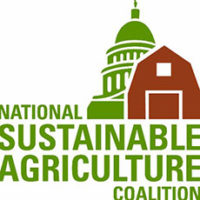
The following op-ed is based on an open letter from National Sustainable Agriculture Coalition (NSAC), whose vision of agriculture is one where a safe, nutritious, ample, and affordable food supply is produced by a legion of family farmers who make a decent living pursuing their trade, while protecting the environment, and contributing to the strength and stability of their communities.
Agriculture is on the front lines of a changing climate. Compared to a generation ago, we are experiencing greater weather extremes, from recurrent 100-year floods to severe and prolonged droughts to greater heat waves that threaten workers, crops and livestock. As temperatures continue to rise, new pest and disease pressures are impacting crop yields and quality. As farmers and ranchers, we are accustomed to adapting to change, but the greater extremes we are experiencing today are unprecedented. Our rural communities lack the resources and infrastructure, making them especially vulnerable to climate change impacts. We recognize that these challenges are not experienced equally—disproportionately affecting socially disadvantaged communities, especially farmers and ranchers of color.
Climate change presents a fundamental threat to our ability to remain viable in the years to come. We must act now to avoid the worst impacts of climate change, reduce our greenhouse gas emissions, change to a renewable energy system and advance a multitude of solutions, including the unique and important climate solutions offered by agriculture. We also need investment in conservation practices and farm programs that make our operations and rural communities more resilient to extreme weather events.
We are committed to being part of the solution. By improving soil health and increasing soil organic matter on our farms and ranches, we have the power to draw down atmospheric carbon levels at the root of climate change. This approach is recognized by farmers and scientists throughout the world as a critical climate strategy. Through our use of soil health practices like cover crops, crop rotation, improved grazing management and reduced tillage our farms and ranches can become net carbon sinks. These same practices are necessary for adaptation to climate disasters; soil organic matter increases water holding capacity and reduces erosion, which can help our operations withstand some weather extremes. We can and must also reduce potent greenhouse gas emissions, like nitrous oxide and methane emissions, through a diversity of strategies.
We must also protect our agricultural land from the ongoing loss to non-agricultural development. When agricultural lands are converted to urban uses, the greenhouse gas emissions associated with that land increase significantly. One study found that an acre of urban land emits 70 times more greenhouse gas emissions than an acre of irrigated cropland and 100 times more than an acre of rangeland. Protecting our farms and ranches will ensure this vast and important land is available for both food production and carbon storage for generations to come.
Our farms and ranches can also produce renewable energy in unique and important ways. More farmers than ever before are taking steps to reduce their reliance on fossil fuels, as well as producing on-farm renewable energy themselves, including solar and wind, with the opportunity to continue to grow this into an even greater source of renewable rural energy.
Many of the climate solutions offered by agriculture provide multiple benefits to our farms, our communities, and our environment. Among them are increased crop yields, greater resilience to weather extremes, improved air and water quality and enhanced wildlife habitat. We should seek to advance climate solutions that provide these multiple benefits.
But agriculture cannot become part of the climate solution without significant investment. We must reduce the risk to producers in shifting to new climate-friendly agricultural practices by investing in relevant technical assistance, financial incentives, and research—especially for socially disadvantaged farmers and ranchers. No climate policy at the national level will be complete or effective without recognizing the role agriculture must play in avoiding the worst impacts of climate change, reducing our greenhouse gas emissions, enhancing our carbon sinks and our resiliency. Our food security depends on embracing agricultural solutions to a changing climate.
These solutions to climate change will promote an agricultural economy that is based on fairness and opportunities for family farms and rural communities.
We cannot afford to wait. Action is needed now to address our changing climate. Agriculture can and must be part of the solution.
If you’re a farmer, sign on to the letter by filling out this form.












Comments